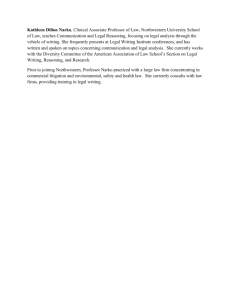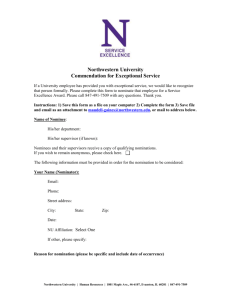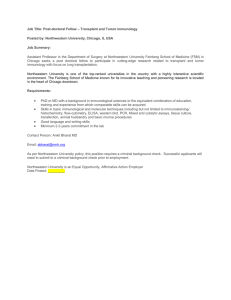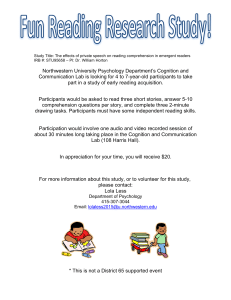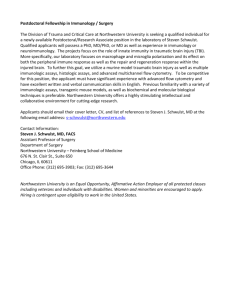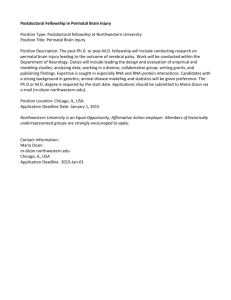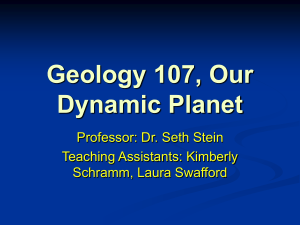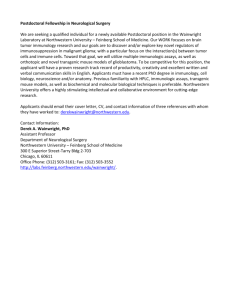Syllabus - Department of Earth and Planetary Sciences
advertisement
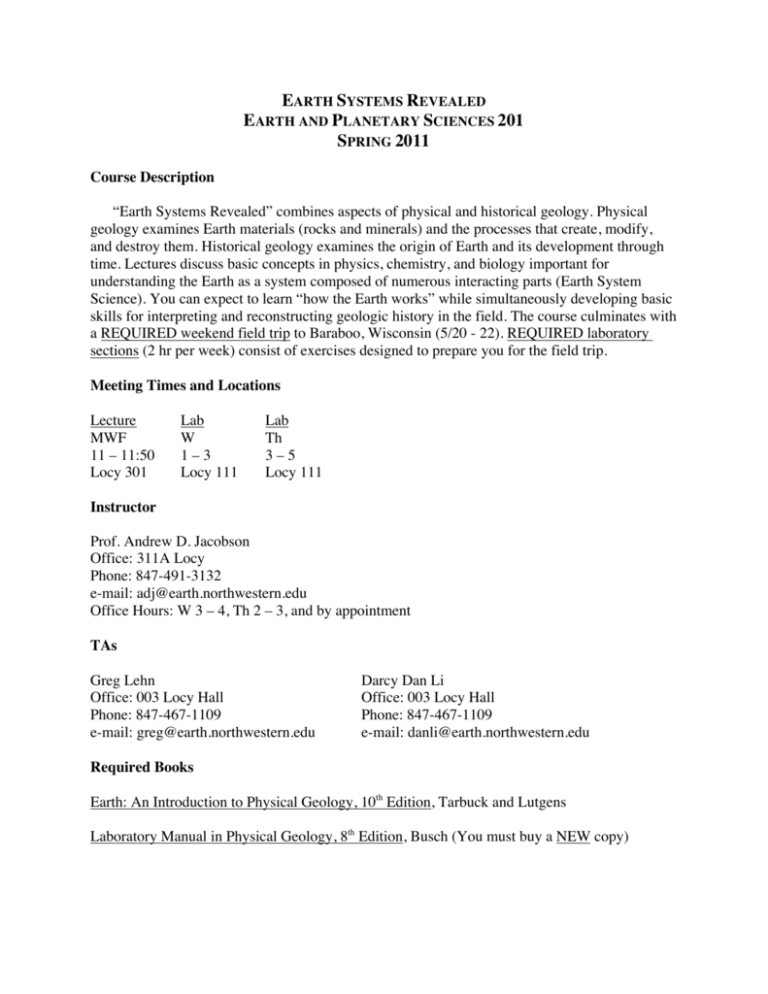
EARTH SYSTEMS REVEALED EARTH AND PLANETARY SCIENCES 201 SPRING 2011 Course Description “Earth Systems Revealed” combines aspects of physical and historical geology. Physical geology examines Earth materials (rocks and minerals) and the processes that create, modify, and destroy them. Historical geology examines the origin of Earth and its development through time. Lectures discuss basic concepts in physics, chemistry, and biology important for understanding the Earth as a system composed of numerous interacting parts (Earth System Science). You can expect to learn “how the Earth works” while simultaneously developing basic skills for interpreting and reconstructing geologic history in the field. The course culminates with a REQUIRED weekend field trip to Baraboo, Wisconsin (5/20 - 22). REQUIRED laboratory sections (2 hr per week) consist of exercises designed to prepare you for the field trip. Meeting Times and Locations Lecture MWF 11 – 11:50 Locy 301 Lab W 1–3 Locy 111 Lab Th 3–5 Locy 111 Instructor Prof. Andrew D. Jacobson Office: 311A Locy Phone: 847-491-3132 e-mail: adj@earth.northwestern.edu Office Hours: W 3 – 4, Th 2 – 3, and by appointment TAs Greg Lehn Office: 003 Locy Hall Phone: 847-467-1109 e-mail: greg@earth.northwestern.edu Darcy Dan Li Office: 003 Locy Hall Phone: 847-467-1109 e-mail: danli@earth.northwestern.edu Required Books Earth: An Introduction to Physical Geology, 10th Edition, Tarbuck and Lutgens Laboratory Manual in Physical Geology, 8th Edition, Busch (You must buy a NEW copy) EVALUATION Homework (10%) The course includes two REQUIRED homework assignments. The assignments will employ a novel computer program called CogSketch, which was developed by the Spatial Intelligence and Learning Center at Northwestern University. More information about CogSketch is attached to this syllabus. Assignments are due one week after the laboratory in which they are assigned. Lab exercises and quizzes (25%) One lab per week is REQUIRED. Labs meet in Locy 111. You may attend either session, but you are encouraged to choose one and stick with it as best as possible. Labs begin with a brief quiz. The purpose of the quiz is to encourage you to show up on time. You cannot make up quizzes if you are late. Exercises count 90% of the total lab grade, while quizzes count 10%. Labs DO NOT meet during the first week of class. Advance arrangement is required to make up missed labs. You must provide a written excuse signed by a doctor, supervisor, etc. No exceptions. Exams I and II (30%) Exam I is multiple choice. Exam II is multiple choice and short answer. Exam II is not cumulative, but some overlap between the first and second parts of the course is unavoidable. Advance arrangement is required to make up missed exams. You must provide a written excuse signed by a doctor, supervisor, etc. No exceptions. Fieldtrip and fieldtrip report (35%) The Baraboo fieldtrip on May 20 – 22 is REQUIRED. Failure to attend the fieldtrip will result in failure of the course. LOGISTICAL DETAILS ABOUT THE FIELDTRIP ARE PROVIDED ON SEPARATE PAGES ATTACHED TO THIS SYLLABUS. REVIEW THIS MATERIAL WELL IN ADVANCE OF THE FIELDTRIP. Information about the report will be provided at a later date and discussed extensively during and after the field trip. By the time the field trip occurs, you will be well prepared. The field trip is designed to be enjoyable and is something to look forward to. Your final report is due no later than noon on Thursday, June 9. You may turn in the report early. HOWEVER, LATE REPORTS WILL NOT BE ACCEPTED. YOU SHOULD TAKE THE REPORT SERIOUSLY AND MAKE EVERY EFFORT TO RETURN HIGH QUALITY WORK. THE REPORT HAS A VERY LARGE EFFECT ON YOUR FINAL GRADE FOR THE COURSE. YOU ARE ENCOURAGED TO GET FEEDBACK ON YOUR REPORT FROM YOUR TA BEFORE TURNING IN THE FINAL VERSION. Extra Credit No extra credit options are available other than questions provided in exams and lab assignments. Attendance and participation All students are REQUIRED to attend lecture and actively participate in discussions on the field trip. Poor attendance could adversely affect your final grade. Grading Scale The following is an example of a grading scale applied in the past: A (94+), A(90 – 93), B+ (86 – 89), B (83 – 85), B- (80 – 82), C+ (76 – 79), C (73 – 75), C- (70 – 72), D (60 – 69), F (59 and below). You should use this grading scale to estimate your performance during the course. However, note the final scale applied could slightly differ. HOMEWORK Homework assignments in EARTH 201 will employ a computer program called CogSketch, developed by the Spatial Intelligence and Learning Center (SILC) at Northwestern University. One assignment will focus on structural geology and geologic time, while another assignment will focus on the carbon cycle and climate change (see the course schedule). Maria Chang from SILC will demonstrate CogSketch in lab during the week of April 18. Maria will also answer all questions related to the homework assignments. Her contact information is: Maria Chang Office: Ford 3-207 e-mail: maria.chang@u.northwestern.edu Phone: 847-467-6145 Office Hours: Drop-in and by appointment Accessing CogSketch As discussed below, there are two ways to obtain and use CogSketch. The first is to download the program and install it on your own computer. The second is to use CogSketch in one of Northwestern’s Computer Laboratories. Downloading CogSketch CogSketch is freely available from the following website: http://www.qrg.northwestern.edu/software/cogsketch/index.html CogSketch runs on Windows computers. It will work with XP, Vista, or Windows 7. You can also run CogSketch on a Mac if you have the program Parallels. You should have at least 1 GB of RAM, and 2GB are preferred. You will need at least 1.5 GB of free disk space to install CogSketch. In terms of drawing, your CogSketch assignments are designed to be doable with a mouse, but if you have access to a Tablet PC (ideal) or an external pen tablet (e.g., a Wacom tablet), you may find the experience more enjoyable. Using CogSketch in Northwestern’s Computer Laboratories Northwestern provides a variety of computer laboratories where you can find PCs with CogSketch installed. The Main Library contains the closest computer laboratories to Locy Hall [Lower Level, Rooms B182 (30 stations) and B183 (30 stations)]. CogSketch will also be available in the Tech Computer Laboratory [Rooms MG51 (18 stations) and MG45 (7 stations)]. How to use CogSketch For each assignment, you will download sketch worksheets. The first assignment has four worksheets, and the second assignment has two worksheets. When you finish the worksheets, you will save the files and e-mail them to the e-mail address provided with the assignments. Each worksheet may take between 10 and 30 minutes to complete depending on the complexity of the problem. Budget your time accordingly. FIELD TRIP BARABOO, WISCONSIN MAY 20 – 22, 2011 READ THIS HANDOUT BEFORE THE FIELD TRIP Transportation Chicago Classic Coach Tour Bus 847-222-6133 Depart: Friday, May 20, 1 PM, Sheridan Road near Northwestern Arch Return: Sunday, May 22, 5 PM, Sheridan Road near Northwestern Arch No other transportation options exist (i.e., you cannot use your own car or have friends and family drop you off or pick you up). Accommodations Willowood Inn S5509 Hwy 123 Baraboo, Wisconsin 53913 Phone: 608-356-5474 FAX: 608-356-5478 E-mail: willowoodinn@willowoodinn.com web: http://www.willowoodinn.com There will be several students per room. Rooms will either be male-only or female-only. You may need to share a double bed with another student. If you prefer, you can bring a sleeping bag and pad. Be prepared for cold weather at night. You may want to bring an extra blanket or sleeping bag. Food Starting with Friday dinner, all meals are provided. If you have special dietary requirements (e.g., vegan) or you are concerned about vegetarian options, you should bring your own food for the entire trip. Requests for vegetarian meals cannot be accommodated at the last minute. We will not have time to purchase snacks during the day, so bring your own snacks if you think you will need a boost. Alcohol Alcoholic beverages are strictly forbidden. Irresponsible conduct will result in both academic and disciplinary consequences. Personal Safety Safety is THE most important factor to consider on the field trip. Rules to follow: DO NOT CLIMB ON ROCK WALLS OR STEEP OUTCROPS WATCH FOR TRAFFIC AT ALL TIMES DURING ROADWAY STOPS KEEP AWAY FROM UNSTABLE ROCK FACES IF YOU CAN'T IDENTIFY PLANTS, DON'T TOUCH THEM FIELD TRIP BARABOO, WISCONSIN MAY 20 – 22, 2011 READ THIS HANDOUT BEFORE THE FIELDTRIP Medical Conditions Inform the TAs or me if you have a medical condition or physical disability that could require special attention in the field or if you are taking prescription medications with potentially adverse side effects. Let us know immediately if you are injured during the trip. Clothing and Equipment Bring clothes suitable for outdoor activity. They will get muddy, dirty, etc. BE PREPARED FOR COLD, RAINY, OR HOT WEATHER AND OCCASIONAL INSECTS. WE SPEND TIME IN THE WOODS, AND POTENTIALLY, IN THE RAIN. Specifically, I recommend: Sturdy shoes or hiking boots, preferably waterproof Waterproof jacket Warm sweater, sweat shirt, or jacket Warm socks, gloves, and hat Sunglasses Pencils, pens, and notebook Daypack Water bottle Camera Small clipboard for notes and handouts Sunscreen and insect repellant Your brain Field Exercises and Report At each stop, you will make a series of observations and measurements. You are highly encouraged to ask questions, engage in discussion, take notes, sketch pertinent features in your notebooks, and take photographs. Photographs are highly recommended, as they will help with your report. Participation will be factored into your fieldtrip grade. After you return home, you will compile your notes into a "field report." I will provide a standard format to follow, but you can add whatever you like, e.g., photographs, sketches, etc. SCHEDULE Date Lecture Reading Lab 3/28 3/30 4/1 Introduction to 201 Earth Structure and Plate Tectonics Minerals None Ch. 1 + 2 Ch. 3 No Lab 4/4 4/6 4/8 Igneous Rocks Volcanism Weathering and Sedimentary Rocks I Ch. 4 Ch. 5 Ch. 6 + 7 Lab 1* Minerals and Igneous 4/11 4/13 4/15 Weathering and Sedimentary Rocks II Metamorphic Rocks Structure Ch. 6 + 7 Ch. 8 Ch. 10 Lab 2* Sedimentary 4/18 4/20 4/22 Geologic Time Earth Through Time Exam I Ch. 9 Ch. 22 Lab 3 Metamorphic CogSketch intro; fault and age dating assignment provided 4/25 4/27 4/29 Earthquakes Interior of the Earth Plate Boundaries Ch. 11 Ch. 12 Ch. 13 + 14 Labs 4*,‡ Structure Fault and age dating assignment due 5/2 5/4 5/6 The Atmosphere-Ocean System Rivers Glaciers None Ch. 16 Ch. 18 Lab 5 Geologic Time 5/9 5/11 5/13 Deserts and Shorelines Climate Change I Climate Change II Ch. 19 + 20 Ch. 21 Ch. 21 Lab 6 Topo Maps Carbon and climate assignment provided 5/16 5/18 5/20 Ch. 21 Lab 7 Baraboo Prep Carbon and climate assignment due 5/21 5/22 Climate Change III Baraboo Prep No Class Depart Evanston 1 PM Baraboo Return Evanston 5 PM 5/23 5/25 5/27 In class Baraboo review (bring questions) In class Exam II review (bring questions) Exam II Exam II Review 5/30 6/1 6/3 No class, Memorial Day No class, reading week No class, reading week Baraboo Report Help 6/9 Baraboo Report Due at 12 PM (may turn in early) Labs noted with this symbol indicate that labs are long and will take the entire lab period. Plan your schedules accordingly. Be sure to bring lab textbook to lab. * ‡ Homework ACADEMIC INTEGRITY All students should review and adhere to Northwestern University's principles regarding Academic Integrity (http://www.northwestern.edu/uacc/) and Weinberg College policies on Academic Integrity (http://www.wcas.northwestern.edu/advising/academic.html). Any suspicions of possible violations will be referred directly to the WCAS Dean's Office. Use of notes, books, and electronic devices (e.g., calculators, PDAs, laptop computers, cellular phones, iPods, etc.) during examinations is prohibited. While it is encouraged that students discuss assignments, ultimately each student must submit his or her own work. Lab partners who collect data together may submit identical data tables, but each student must prepare his or her own lab report. Copying assignments is unacceptable and will result in disciplinary action. Students must cite materials taken from websites, books, journals, or other sources. Materials taken verbatim must be clearly identified with quotations. Failure to do so may constitute plagiarism.
